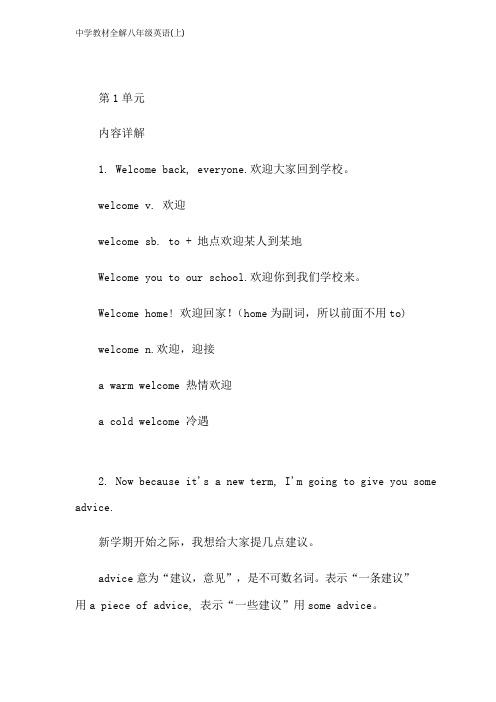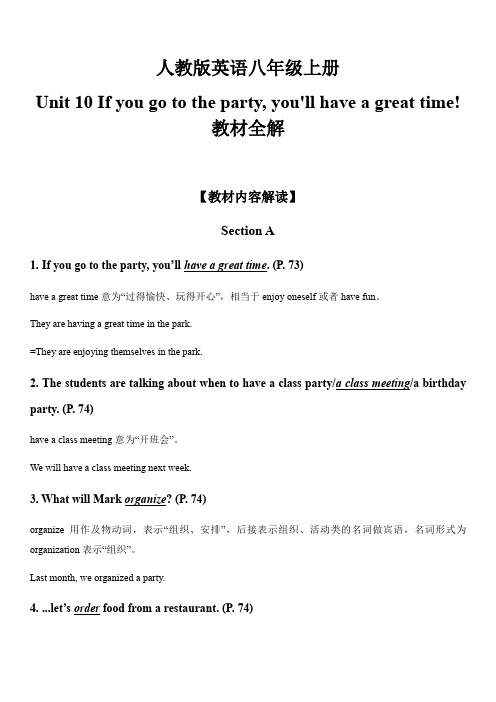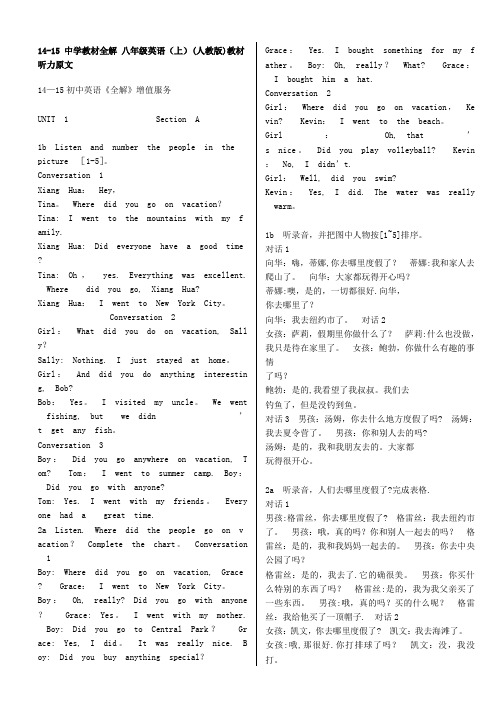中学教材全解八年级英语(上)
- 格式:doc
- 大小:63.50 KB
- 文档页数:10

第1单元内容详解1.Welcome back,everyone.欢迎大家回到学校。
welcome v.欢迎welcome sb.to+地点欢迎某人到某地Welcome you to our school.欢迎你到我们学校来。
Welcome home!欢迎回家!(home为副词,所以前面不用to)welcome n.欢迎,迎接a warm welcome热情欢迎a cold welcome冷遇2.Now because it's a new term,I'm going to give you some advice.新学期开始之际,我想给大家提几点建议。
advice意为“建议,意见”,是不可数名词。
表示“一条建议”用a piece of advice,表示“一些建议”用some advice。
I'll give you some advice on how to look after your pet dog.我将给你一些怎样照顾你的宠物狗的建议。
[搭配]—give sb.some advice/give some advice to sb.给某人提一些建议ask for advice征求意见follow/take sb.’s advice接受某人的建议7.拓展advise是动词,意为“建议”,后接名词、代词或动名词作宾语,也可用于advisesb.(not)to do sth.结构,意为“建议某人(不要)做某事”。
She advised us to wait(for)one more day.她建议我们再等一天。
3.Why don't you write it down?你们为何不把它记下来呢?(1)Why don't you do…?是英语中一个重要的句型,意为“你(们)为什么不做事呢?”,多用来向对方提出建议。
该句型还可简化为“Why not do…?”。

人教版英语八年级上册Unit 10 If you go to the party, you'll have a great time!教材全解【教材内容解读】Section A1.If you go to the party, you’ll have a great time. (P. 73)have a great time意为“过得愉快、玩得开心”,相当于enjoy oneself或者have fun。
They are having a great time in the park.=They are enjoying themselves in the park.2. The students are talking about when to have a class party/a class meeting/a birthday party. (P. 74)have a class meeting意为“开班会”。
We will have a class meeting next week.3. What will Mark organize? (P. 74)organize用作及物动词,表示“组织、安排”,后接表示组织、活动类的名词做宾语,名词形式为organization表示“组织”。
Last month, we organized a party.4....let’s order food from a restaurant. (P. 74)order此处表示“订购、点菜”,order sth. from...表示“从……订购某物”。
I ordered some chicken from that shop.【拓展】order还可以作及物动词,意为“命令”,表示“命令”时,常用于order sb. (not) to do sth.结构中The police ordered him to wait right here.5.If we ask people to bring food, they’ll just bring potato chips and chocolate because they’ll be too lazy to cook. (P. 74)ask sb. to do sth.意为“要求某人做某事”,否定形式为ask sb. not to do sth.“要求某人不要做某事”。

14-15 中学教材全解八年级英语(上)(人教版)教材听力原文14—15初中英语《全解》增值服务UNIT 1 Section A1b Listen and number the people in the picture [1-5]。
Conversation 1Xiang Hua:Hey,Tina。
Where did you go on vacation?Tina: I went to the mountains with my f amily.Xiang Hua: Did everyone have a good time ?Tina: Oh,yes. Everything was excellent.Where did you go, Xiang Hua?Xiang Hua:I went to New York City。
Conversation 2Girl:What did you do on vacation, Sall y?Sally: Nothing. I just stayed at home。
Girl:And did you do anything interestin g, Bob?Bob:Yes。
I visited my uncle。
We went fishing, but we didn’t get any fish。
Conversation 3Boy:Did you go anywhere on vacation, T om? Tom:I went to summer camp. Boy:Did you go with anyone?Tom: Yes. I went with my friends。
Every one had a great time.2a Listen. Where did the people go on v acation?Complete the chart。

第1篇一、教材概述《中学教材全解英语八上外研教研版》是一本针对我国中学英语教材《英语》(外研社版)八年级上册的辅导用书。
该书由我国知名英语教育专家、一线教师共同编写,旨在帮助学生全面、系统地掌握教材内容,提高英语学习效果。
二、教材特点1. 内容全面:本书涵盖了《英语》八上教材的全部内容,包括词汇、语法、阅读、写作、听力等各个方面,确保学生能够全面掌握英语知识。
2. 解析详细:针对教材中的每个知识点,本书都进行了详细的解析,帮助学生理解并掌握重点、难点。
3. 例题丰富:本书配备了大量的例题,旨在帮助学生通过练习巩固所学知识,提高解题能力。
4. 模拟试题:为了检验学生的学习效果,本书还提供了丰富的模拟试题,帮助学生熟悉考试题型,提高应试能力。
5. 图文并茂:本书采用图文并茂的形式,使内容更加生动、形象,提高学生的学习兴趣。
三、教材内容1. 词汇:本书对教材中的词汇进行了详细的解析,包括词性、词义、用法等,并提供了丰富的例句,帮助学生记忆和运用。
2. 语法:本书对教材中的语法知识进行了系统梳理,包括时态、语态、非谓语动词、情态动词等,并配有相应的练习题,帮助学生巩固语法知识。
3. 阅读:本书对教材中的阅读材料进行了详细解读,包括文章结构、主旨大意、细节理解等,并提供了相应的练习题,提高学生的阅读能力。
4. 写作:本书对教材中的写作技巧进行了详细介绍,包括文章结构、段落安排、句型运用等,并提供了丰富的写作素材和范文,帮助学生提高写作水平。
5. 听力:本书对教材中的听力材料进行了详细解析,包括听力技巧、题型分析等,并提供了相应的练习题,提高学生的听力能力。
四、学习方法1. 课前预习:在上课前,学生应提前预习教材内容,了解课文大意,为课堂学习做好准备。
2. 课堂听讲:在课堂上,学生应认真听讲,做好笔记,掌握老师讲解的重点、难点。
3. 课后复习:课后,学生应复习当天所学内容,巩固知识点,解决疑难问题。
4. 练习巩固:通过大量的练习题,学生可以巩固所学知识,提高解题能力。

人教版英语八年级上册Unit 10 If you go to the party, you'll have a greattime!教材全解[教材内容解读]Section A1.If you go to the party, you’ll have a great time. <P. 73>have a great time意为"过得愉快、玩得开心",相当于enjoy oneself或者have fun。
They are having a great time in the park.=They are enjoying themselves in the park.2. The students are talking about when to have a class party/a class meeting/a birthday party. <P. 74>have a class meeting意为"开班会"。
We will have a class meeting next week.3. What will Mark organize? <P. 74>organize用作及物动词,表示"组织、安排",后接表示组织、活动类的名词做宾语,名词形式为organization表示"组织"。
Last month, we organized a party.4....let’s order food from a restaurant. <P. 74>order此处表示"订购、点菜",order sth. from...表示"从……订购某物"。
I ordered some chicken from that shop.[拓展]order还可以作及物动词,意为"命令",表示"命令"时,常用于order sb. <not> to do sth.结构中The police ordered him to wait right here.5.If we ask people to bring food, they’ll just bring potato chips and chocolate because they’ll be too lazy to cook. <P. 74>ask sb. to do sth.意为"要求某人做某事",否定形式为ask sb. not to do sth."要求某人不要做某事"。

人教版英语八年级上册Unit 1 Where did you go on vacation?教材全解【教材内容解析】Section A1.Where did you go on vacation? (P. 1)on vacation意为“在度假”,结构“on+名词”表示“在某种状态中”。
My family went to Hainan on vacation last year.2....visited my uncle (P. 1)visit此处用作及物动词,后接人或物做宾语,意为“拜访、看望”,后接表示地点的名词,意为“参观、游览”。
I visited my grandmother last week.Do you want to visit Shanghai?3....go with anyone? (P. 2)(1)anyone用作不定代词,意为“有人、任何人”,相当于anybody,用于疑问句和否定句中,在肯定句中用someone或者somebody。
但是anyone也可以用在肯定句中,表示“任何一个人”。
Did you meet anyone friendly in that city?Anyone can be helpful in some way.(2)anyone只能指人,不可以指物,后面不接of短语;any one既可以指人也可以指物,后可接of短语。
Anyone in my class knows any one of the singers and any one of their sons.4....buy anything special? (P. 2)(1)buy用作双宾语动词,表示“买”,常用的结构为“buy sb. sth.”或者“buy sth. for sb.”,表示“为某人买某物”。
My father bought me a bike.=My father bought a bike for me.【拓展】可接双宾语的动词还有give, bring, show, tell, sell等。
人教版英语八年级上册Unit 10 If you go to the party,you'll have a greattime!教材全解【教材内容解析】Section A1.If you go to the party, you'll have a great time。
(P. 73)have a great time意为“过得愉快、玩得开心”,相当于enjoy oneself或者have fun。
They are having a great time in the park.=They are enjoying themselves in the park。
2. The students are talking about when to have a class party/a class meeting/a birthday party. (P。
74)have a class meeting意为“开班会"。
We will have a class meeting next week.3。
What will Mark organize?(P。
74)organize用作及物动词,表示“组织、安排”,后接表示组织、活动类的名词做宾语,名词形式为organization表示“组织”.Last month, we organized a party。
4.。
let’s order food from a restaurant。
(P。
74)order此处表示“订购、点菜”,order sth. from。
.。
表示“从……订购某物"。
I ordered some chicken from that shop。
【拓展】order还可以作及物动词,意为“命令”,表示“命令”时,常用于order sb。
(not) to do sth。
结构中The police ordered him to wait right here。
(5·3)初二上册英语1~6单元教材知识全解Module1Advice不是可数名词。
一条建议是a piece of advice,两条建议时two pieces of advice这里why don’t yo u…?是用来表示提出某种建议时,而不是询问为什么不做某事的原因。
例如:why don’t you drive to the park?OK我们为什么吗不开车去公园呢?好的。
拓展:提建议时还可以用其他句型。
如:why not take a walk in the park?为何不在公园散步?what/how about going to Europe for a holiday?去欧洲度假怎么样?What else?接在几个建议之后,相当于:what else should you do?Else一般接在疑问句或某些代词之后。
如:who else did you see at the meeting?你在会上还看见谁了?Does anyone else want to read this book?还有别人想看这本书吗?Try to do sth试图做某事try not to do sth试图不要做某事try doing sth尝试着做某事Help sb with sth帮助某人做某事Enjoy doing sth喜欢干某事。
Enjoy oneself=have a good timeIt take sb some time to do sth干某事花某人多长时间Take a deep breath 深呼吸在smiling always helps中的help 的意思是起作用Or 表示否定句或疑问句中的并列。
You see 时定语从句,限制修饰前边的名词,相当于后置定语。
Module2表达来自……用be form/come formSo 意味因此,表因果关系。
And表并列,but表转折当你有意想不到的消息要告诉对方时,可以使用guess what !Prize在此是名词,意为奖,奖励,奖赏,奖品。
M11知识梳理Unit 1 In China, we open a gift later.1. What a surprise! 多么令人惊讶啊!Surprise在此为形容词,意为“惊讶”。
其形容词形式为surprising(指物)/surprised(指人)。
另外,surprise还可作动词,后接人作宾语,意为“使……惊奇或震惊”。
. The news greatly surprised us.【固定短语】(1)to one’s surprise 意为“使某人吃惊的是……”,它对全句进行解释或说明,表示说话人对上文的看法和态度,一般放在句首。
. To our surprise, the boy won the prize.(2)in surprise 意为“惊奇地;吃惊地”,它修饰谓语动词。
. “How did you come here?”she said in surprise.(3)be surprised 意为“感到惊讶”,可单独使用或跟不定式。
. When I received his letter, I was very surprised.【小试牛刀】2. In China, you accept a gift with both hands. 在中国,你必须双手接收礼物。
(1)【辨析】receive和acceptreceive表示客观上的收到,而accept表示主观上的接受。
. The girl received a gift but she didn’t accept it .(2)both意为“都”,强调两者,常用短语为both…and。
both…and 引导并列主语时,谓语动词用复数形式。
. Both Jim and his sister like playing basketball.【小试牛刀】3. That’s interesting! I’m interested to know all the Chinese traditions. 太有趣了!我对了解所有的中国传统习惯很感兴趣。
最新--中学教材全解-⼋年级英语(上)(⼈教版)教材听⼒原⽂14-15 中学教材全解⼋年级英语(上)(⼈教版)教材听⼒原⽂14-15初中英语《全解》增值服务UNIT 1 Section A1b Listen and number the people in the picture [1-5].Conversation 1Xiang Hua: Hey,Tina. Where did you go on vacation? Tina: I went to the mountains with my f amily.Xiang Hua: Did everyone have a good time ?Tina: Oh, yes. Everything was excellent. Where did you go, Xiang Hua?Xiang Hua: I went to New York City.Conversation 2Girl: What did you do on vacation, Sally ?Sally: Nothing. I just stayed at home. Girl: And did you do anything interesting , Bob?Bob: Yes. I visited my uncle. We went f ishing, but we didn’t get any fish. Conversation 3Boy: Did you go anywhere on vacation, To m? Tom: I went to summer camp. Boy: D id you go with anyone?Tom: Yes. I went with my friends. Everyo ne had a great time.2a Listen. Where did the people go on v acation? Complete the chart. Conversation 1Boy: Where did you go on vacation, Grace ? Grace: I went to New York City. Boy: Oh, really? Did you go with anyone? Grace: Yes. I went with my mother. B oy: Did you go to Central Park? Grace: Yes, I did. It was really nice. Boy: Did you buy anything special?Grace: Yes. I bought something for my fa ther. Boy: Oh, really? What? Grace: I bought him a hat.Conversation 2Girl: Where did you go on vacation, Kevi n? Kevin: I went to the beach.Girl: Oh, that’s nice. Did you play volleyball? Kevin: No, I didn’t.Girl: Well, did you swim?Kevin: Yes, I did. The water was really warm.1b 听录⾳,并把图中⼈物按[1~5]排序。
Module 1 How to learn English第1单元内容详解1. Welcome back, everyone.欢迎大家回到学校。
welcome v. 欢迎welcome sb. to + 地点欢迎某人到某地Welcome you to our school.欢迎你到我们学校来。
Welcome home! 欢迎回家!(home为副词,所以前面不用to)welcome n.欢迎,迎接a warm welcome 热情欢迎a cold welcome 冷遇2. Now because it's a new term, I'm going to give you some advice.新学期开始之际,我想给大家提几点建议。
advice意为“建议,意见”,是不可数名词。
表示“一条建议”用a piece of advice, 表示“一些建议”用some advice。
I'll give you some advice on how to look after your pet dog.我将给你一些怎样照顾你的宠物狗的建议。
[搭配] —give sb. some advice / give some advice to sb. 给某人提一些建议ask for advice 征求意见follow / take sb.’ s advice 接受某人的建议7. 拓展advise是动词,意为“建议”,后接名词、代词或动名词作宾语,也可用于advisesb. (not) to do sth.结构,意为“建议某人(不要)做某事”。
She advised us to wait (for) one more day. 她建议我们再等一天。
3. Why don't you write it down? 你们为何不把它记下来呢?(1)Why don't you do…?是英语中一个重要的句型,意为“你(们)为什么不做事呢?”,多用来向对方提出建议。
该句型还可简化为“Why not do…?”。
Why don't you read newspapers in English? = Why not read newspapers English?你为什么不读英文报纸呢?中考链接一Look! It's raining heavily. ______ take a raincoat with you?—Well, I'll take one right now.A. Why notB. Why don'tC. Would you mindD. Would you like解析:四个选项都是提建议的句型,但后跟的动词形式不一样:Why not + 动词原形…?Why don't you + 动词原形?Would you mind doing…?Would you like to do...?所以只能选A。
答案:A(2)write down意为“写下,记下”,其同义短语为put down。
其宾语若是名词,放在down前后均可;若是代词作宾语,须放在down之前。
Please write down these new words in your notebook.=Please write these new words down in your notebook.请把这些生词记在你的笔记本上。
Please write them down. 请把它们记下来。
4. You should always speak English in class. 课堂上大家应该一直讲英语。
speak v.说话;讲(语言)Can you speak English? 你会讲英语吗?辨析:say,speak, talk 与tell1.say “说,讲”,着重译调讲话的内容,指用口头或书面语言表达思想2.speak “说,演讲”侧重于讲话的动作;speak后常接表示某种语言的名词。
3.talk “交谈,谈话”,指跟少数人“随意地说”,不侧重说的内容。
Talk常与介词to, with, about连用4.tell“告诉,讲述”多指以口头方式告诉某人,常用于讲故事等。
He says he will go to Shanghai to visit his grandparents.他说他将去上海看望他的爷爷奶奶。
The child is learning to speak.这个孩子正在学习说话。
Don't talk with each other freely in class.上课不要随便相互交谈Tell me the time, please.请告诉我时间。
一言辨异After she spoke at the meeting, she talked with the students. She told them that what she said was very important.在会上发了言之后,她跟学生们进行了交谈,并告诉他们她讲的东西很重要。
5. What else? 还有其他的吗?else常用在不定代词、疑问代词或疑问副词之后作后置定语。
He has something else to tell you. 他还有一些别的事情要告诉你。
Who else are you waiting for? 你还在等谁?辨析:else 与other两者都可意为“其他的,另外的”,但用法不同:(1)else用作形容词或副词,常用于修饰不定代词、疑问代词或疑问副词,也可以修饰all, much,little等词,修饰这些词时,else要位于其后,作后置定语。
Where else are you going? 你还要去哪儿?I'm taking some clothes and books, not much else.我要带几件衣服和一些书,别的就没什么了。
else还可以构成所有格,即else's, 意为“另外的/ 其他的(人或物)”。
My books are much more than anybody else's. 我的书比其他任何人的书都多很多。
(2)other作形容词,用以修饰名词或代词,位于其前作定语。
We learn Chinese, maths, English and some other subjects at school.我们在学校学习语文、数学、英语,还有一些其他的科目。
other作代词,可以单独作主语、宾语、表语,其复数形式为others。
Some students are playing under the tree and others are flying kites over there. 一些学生在树下玩耍,还有一些在那边放风筝。
_6. It's a good idea to check your vocabulary notebook every day.每天核査一下自己的词汇笔记是个好主意。
本句为“It is +名词(短语)+ to do sth. ”句式,it是形式主语,动词不定式短语是句子的真正主语。
It's your turn to play the piano. 轮到你弹钢琴了。
7. How about listening to the radio or reading a newspaper in English?听听英文广播,读读英文报纸怎么样?How about...?相当于“What about…?”,用来与对方商量或者询问对方的情况或意见,about是介词,后跟名词、代词或动名词。
I like English. How about you? 我喜欢英语。
你呢?How about going fishing? 去钩鱼怎么样?中考链接一How about raising money for the people in Yushu, Qinghai?A. Good ideaB. Enjoy yourselfC. Never mindD. You're welcome解析:How about...? 句型用于征求建议,其肯定回答用Good idea。
答案:A8. But try not to translate every word. 但是尽量不要逐词翻译。
(1)try to do sth. 尽力去做某事。
此结构也是提出建议的一种方式,它的否定形式为:try not to do sth. 尽力不要做某事。
拓展try doing sth. 表示“尝试傲某事”。
He tried putting some sugar into the coffee. 他试着往咖啡里加了一些糖。
(2)translate意为“翻译,译”,是动词。
常见搭配: translate…into... 意为“把……译成……”,也可以表示为put…into…或change…into…Would you like to translate the passage about Zhou Jielun into English for me?—Would you like to put the passage about Zhou Jielun into English for me?—Would you like to change the passage about Zhou Jielun into English for me?你能帮我把这篇关于周杰伦的文章翻译成英语吗?9. I think everyone should have a pen friend and write email messages to each her.我认为每个人都应该交一个笔友,并互相发送电子邮件。
everyone意为“每个人”,相当于everybody,表示一个单数概念。
当everyone作主语时,谓语动词要用单数形式。
Everyone likes the movie. 每个人都喜欢这部电影。
拓展(1)everyone用于否定句,表示部分否定。
Everyone here doesn't like durian. —Not everyone here likes durian.并不是这里的所有人都喜欢榴莲。
(2)everyone在反意疑问句中,反问部分的主语常用they。
Everyone is right, aren't they? 大家都对,是吗?Everyone comes here,don't they? 大家都来了,是吗?10. She can help me with my homework.她可以帮我做作业。